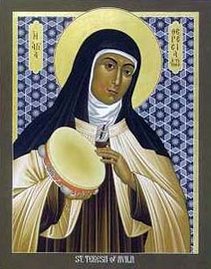Born in Asia Minor, St. Nicholas was known for his great charity, and for the
innumerable miracles he performed. He was an ardent apostle and preacher
of truth, and took part on the Council of Nicea which condemned the Arian
heresy. Because of his devout care of the young, he is looked upon as the
patron of children. Seven hundred years after his death, his holy remains
were translated to Bari, Italy. Let us imitate St. Nicholas' charity and
love for truth.
I think if I hear the word community one more time I will scream. What makes a community, anyway? The American Heritage Dictionary defines the word as, among other things, 'a group of people living in the same locality and under the same government,' 'a group of people having common interests,' and 'sharing, participation, and fellowship.'
OK, I'm a member of several communities, then. My neighborhood, my city, county, state, and country; the Confraternity of Penitents is a community of which I am a member; and I get plenty of the third part of the definition when I either (a) eat a meal with my family, (b) go to a friend's home to eat or socialize, or (c) have donuts and coffee with my fellow parishioners after Divine Liturgy.
So why the NO emphasis on community? This is just the opinion of one person, but it seems that over the past several years the TRUTH has been watered down, and without the TRUTH to hold members of a parish firmly in place together as a light 'shining in the darkness,' some are looking for other ways to give people a sense of belonging. But I think that's just wrong. We're supposed to be 'in the world, yet not of the world.' Right? So it follows naturally to me that when one goes about trying to impose worldly attributes on something that's beyond this world by its very definition (the Catholic Faith), then only chaos and havoc can result.
Something I have discovered lately, as I try to become more educated about my Faith and the issues facing the Church: the more closely one tries to walk in the footsteps of Jesus, and to live an authentically Christian life, the smaller one's world becomes. If you're really serious about it, of course. One just has to decide how serious one is.
We're currently missing one hermit crab - I hope it's molting and hasn't escaped! (Small crab molted successfully; the medium-sized one is the one who is AWOL at the moment).
The Great Moravian Sugar Cake Project is proceeding as scheduled - 24 pieces in the freezer now!
You know, it never ceases to amaze me how you can put together the most basic things, such as the ingredients in sugar cake, and have them end up as something beautiful and tasty, to share with others! Just like our faith. Flour, an ingredient in many foods; the Holy Scriptures, the basic foundation of many Christians' faith. Butter, eggs and sugar: basic foods once again, but they serve to make the flour into dough for the cake as well as improving the taste; Tradition and the Magisterium of the Church, along with the writings of the Church Fathers and Councils give us understanding of the Scriptures and help us 'digest' it into our hearts and lives; the potato, a vegetable of immense nutritional value that grows hidden underground; the sacraments, whose action through the Holy Spirit is hidden but whose 'nutritional value' for our souls can never be fully comprehended. The sweetness of brown sugar and warmth of cinnamon are like the sweetness and warmth of the Blessed Mother as she watches over us from heaven. And finally the most important ingredient of all, the yeast - we are called to be a 'leaven in the world' - to change the world by first changing ourselves, the members of our families, then overflowing through the action of the Holy Spirit to change all with whom we come into contact.
Pax et bonum, and remember to pray for at least two priests today!


1 comment:
Love the analogy between the essentials of our Catholic Faith & the ingredients of Moravian Sugar Cake!
Post a Comment